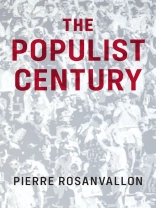Populism is an expression of anger; its appeal stems from being presented as the solution to disorder in our times. The vision of democracy, society, and the economy it offers is coherent and attractive.
At a time when the words and slogans of the left have lost much of their power to inspire, Pierre Rosanvallon takes populism for what it is: the rising ideology of the twenty-first century. In The Populist Century he develops a rigorous theoretical account of populism, distinguishing five key features that make up populist political culture; he retraces its history in modern democracies from the mid-nineteenth century to the present; and he offers a well-reasoned critique of populism, outlining a robust democratic alternative.
This wide-ranging and insightful account of the theory and practice of populism will be of great interest to students and scholars in politics and the social sciences and to anyone concerned with the key political questions of our time.
Cuprins
Introduction: Conceptualizing populism
I. Anatomy
1. A Conception of ‘The People’: The People as One Body
2. A Theory of Democracy: Direct, Polarized, Immediate
3. A Mode of Representation: A Leader Embodying the People
4. A Politics and a Philosophy of Economics: National Protectionism
5. A Regime of Passions and Emotions
6. The Unity and Diversity of Populisms
II. History
1. History of Populist Moments (I): Caesarism and Illiberal Democracy in France
2. History of Populist Moments (II): The Years 1890-1914
3. History of Populist Moments (III): The Latin American Laboratory
4. Conceptual History: Populism as a Democratic Form
III. Critique
1. Introduction
2. Polarized Democracy vs. Pluralized Democracy
3. From an Imaginary People to a Constructable Democratic Society
4. The Horizon of Democratorship: The Issue of Irreversibility
Conclusion: The Spirit of an Alternative
Annex: History of the word ‘populism’
Works Cited
Notes
Index
Despre autor
Pierre Rosanvallon is Professor at the Collège de France and the author of many books on political theory and democracy, including Good Government, The Society of Equals and Counter-Democracy.












